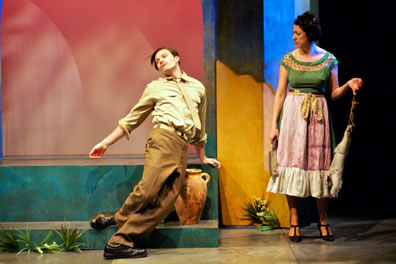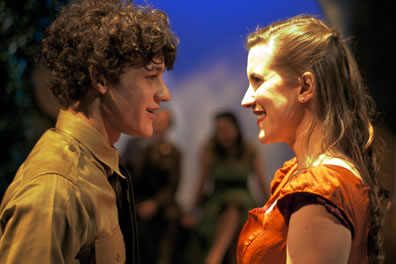Much Ado About Nothing
Screwing Comedy to Many Sticking Points
The Philadelphia Shakespeare Theatre, Philadelphia, Pa.
Saturday, April 6, 2013 (fourth row, middle section of box theater)
Directed by Domenick Scudera

Benedick (Chance Dean) tries to put on debonairly romantic airs as Beatrice (Eleni Delopoulos) fetches him in to dinner in the Philadelphia Shakespeare Theatre production of Much Ado About Nothing. Photo by Chris Miller, Philadelphia Shakespeare Theatre.
I had much trepidation with this Much Ado About Nothing. In his program notes, director Domenick Scudera comments on the play's "contrasting serious side." Well, all of Shakespeare's comedies have that, but I worried that Scudera might follow the choice of too many overly analytical directors and take the path of darkness into the play rather than playing in its prevailing funlight. He does make a feint in that dark direction in the opening scene: As Beatrice (Eleni Delopoulos) remarks on Benedick's always ending their wit matches on "a jade's trick," the stage lights isolate her while she says her line, "I know you of old" as a bitter aside. Is this to be a Much Ado about tormented souls?
Then the play's most tormented soul, Claudio, carrying the company's luggage, trips and sends all the duffel bags scattering. With Claudio as a pratfalling clown, Don John and Borachio as vaudevillian villains, and Clark Gable as Benedick, this Much Ado turns into an easy-going, intelligent comic romp.
Benedick is not really played by Gable, but Chance Dean not only looks like the famous movie actor but plays Benedick in that smirking Rhett Butler style. This is an apt comparison in more ways than the actor's physical appearance and behavior. Scudera, a fan of circa 1940 screwball comedy films, infuses this production with the flavors of such films as His Girl Friday, Vivacious Lady, and It Happened One Night. It's fitting, as Shakespeare's play essentially created the genre of wit-warring couples in romantic comedies, and it certainly works as the thematic framework for this production. Scudera has even given his Much Ado a post–World War II setting as costume designer Brian Strachan dresses Don Pedro and his company in vintage U.S. Army uniforms and the women in shapely but simple, puff-shouldered, knee-length dresses and high heels.
Given this screwball comedy direction, Dean is allowed to take his Benedick to zany places. Aside from nailing the jokes in the text and interacting directly with the audience in his soliloquies, Dean gives Benedick a freewheeling smarm and a jesting temperament that always seem just a tad out of step with the environment around him. "This looks not like a nuptial," he cracks as the Claudio-Hero wedding has already degenerated with the accusations of harlotry, and as the only laugh he gets is from the audience he realizes, too late, this is no joking matter. His Benedick reaches his most ridiculous state when Beatrice enters to fetch Benedick to dinner after he's been gulled into believing she loves him. Dean's Benedick goes overboard with what he thinks is charm, and he resembles nothing so much as Bugs Bunny courting a female rabbit, casting moon eyes at Beatrice, going all loosey-goosey in posture in what he thinks is being debonair, even melting onto the villa pattio as if his bones have turned malleable. The real rabbit in this scene, though, is the dead one Beatrice is holding in one hand with a meat cleaver in her other hand. Wearing an apron over her dress and real disdain on her expression, she looks like she could skin more than that rabbit. I've witnessed a lot of bizarre moments in my 40 years of Shakespeareancing, and this one is among the zaniest.
This Benedick isn't all silly, though. Dean gives him a noble maturity when, after his initial shock at Beatrice's demand that he kill Claudio, he agrees to challenge his young friend to a reckoning. Later, after some lightly witty repartee in the way of awkward courting, Dean's Benedick asks Beatrice, "How doth your cousin? … And how do you?" with genuinely tender care. With all the great dialogue this play has, this simple interchange becomes the sweet heart of this production. Even after Benedick returns to his smart-ass ways in the second wedding (he's in on the hoax of Hero's fake death, so he can't help smirking around Don Pedro and Claudio) and denies his love for Beatrice, we don't believe it. In fact, Dean's Benedick seems a bit relieved that the two love letters are produced, proving "our own hands against our hearts."
Delopoulos's Beatrice is a good match for this Benedick. She clearly has superior intellect, and she gets under his skin because she sees through his act. Delopoulos plays Beatrice with a bit of insecurity around the contours of her public self-confidence, and she enjoys nothing more than seeing Benedick taken down a peg or three. However, while she dismisses Benedick's jesting ways early on, once they believe they are in love with each other, Delopoulos shows Beatrice appreciating Benedick's schtick, even laughing at his mistimed jests.
The great discovery of this production, though, is Claudio. Isaiah Ellis plays him as a pratfalling fool displaying silly naiveté and comic over-eagerness in love and despair. True, this may not jibe with the description of him as bearing himself in the wars "beyond the promise of his age, doting in the figure of a lamb the feats of a lion," but it does fit well with the production's overall comic bearing while endearing us to the character. When he aborts his wedding with Hero (spunkily played by Lauren Sowa), this Claudio comes off as the victim he is as Ellis adeptly transitions from the fool to the fooled. He accuses but doesn't abuse Hero, no more than as a hurt lion roaring in anguish, and as such he glides out the rest of the play on our sympathy.

Claudio (Isaiah Ellis) is smitten with Hero (Lauren Sowa) in Much Ado About Nothing. Claudio's pratfalling innocence endears him to the audience, allowing him to come off as much a victim as Hero is in the wedding scene. Photo by Chris Mill, Philadelphia Shakespeare Theatre.
With a cast of 12, Scudera has chosen to cut parts rather than double roles. The messenger at the beginning is a letter Leonato reads. Ursula is gone. Conrad also is cut while Verges and the members of the watch are combined, so the drunk Borachio (humorously played by Alex Stewart) tells the story of his role in Don John's scheme to the surprised Verges (in a suitably over-the-top performance by Johnny Smith). Antonio, Leonato's brother, is also excised, and Ralph Edmonds, who plays Leonato with friendly stateliness, turns his conversation with Antonio into a moving soliloquy, a rare but perfectly proportioned injection of the comedy's "contrasting serious side" into the proceedings.
In another combination of characters, Patrick Lamborn plays Friar Francis as wedding priest and sexton and also serves as ever-present musician, both within and for the play, providing musical fills on bass, guitar, and mandolin. Lamborn composed the music, which serves as both a soundtrack and commentary on the action—sometimes to the annoyance of the characters. When Claudio waxes dreamily on Hero, Lamborn accompanies him with a lovelorn guitar until Benedick silences the instrument. The music is elemental to the production's comic environment, as Beatrice will stick her hand out and another hand emerges from offstage to hand her a banjo that she begins playing alongside Lamborn.
Such sophisticated silliness, along with Don John's mugging villainy as played by Ian Sullivan, Borachio engaging in knockabout slapstick with the bumbling Constable Verges and the incompetent Detective Dogberry (Eric Van Wie), and Shakespeare's wit-driven text are all presented here in equal measures. The heaping helpings of each of these comic ingredients with just a pinch of seriousness make this Much Ado a sweet concoction, and fulfilling, too.
Eric Minton
April 11, 2013
Comment: e-mail editorial@shakespeareances.com.
Start a discussion in the Bardroom



 Find additional Shakespeareances
Find additional Shakespeareances